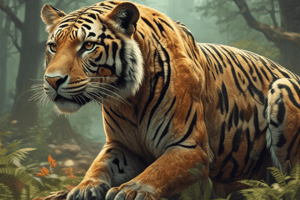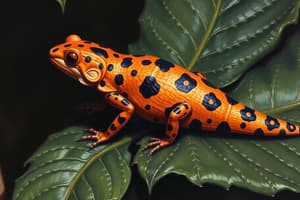Podcast
Questions and Answers
Which lizard do you think the hawk would most likely try to catch on a brown rock?
Which lizard do you think the hawk would most likely try to catch on a brown rock?
The white lizard.
Which lizard do you think the hawk would most likely try to catch on a dune of white sand?
Which lizard do you think the hawk would most likely try to catch on a dune of white sand?
The brown lizard.
How might mutations introduce variation into a population?
How might mutations introduce variation into a population?
Mutations introduce new alleles in the genes, leading to different characteristics.
Can a single offspring inherit both chromosomes from one parent?
Can a single offspring inherit both chromosomes from one parent?
What is a second source of variation in a population?
What is a second source of variation in a population?
How might variation affect the competition between offspring?
How might variation affect the competition between offspring?
How does fitness relate to the color of insects?
How does fitness relate to the color of insects?
How might an insect's fitness affect its chances of being eaten by birds?
How might an insect's fitness affect its chances of being eaten by birds?
Was the principle of natural selection demonstrated in your experiment?
Was the principle of natural selection demonstrated in your experiment?
Why is variation necessary for evolution by natural selection to occur?
Why is variation necessary for evolution by natural selection to occur?
Flashcards are hidden until you start studying
Study Notes
Predator-Prey Coloration
- A white lizard is more vulnerable to a hawk when on a brown rock due to poor camouflage.
- A brown lizard stands out on white sand, making it more easily detectable by predators.
Mutation and Genetic Variation
- Mutations introduce new alleles into a population, resulting in varied traits among organisms.
- Variability derived from mutations can be passed down through generations, increasing genetic diversity.
Chromosome Inheritance
- Offspring cannot inherit both chromosomes from a single parent; chromosomes are distributed randomly due to independent assortment.
Natural Selection
- A second source of variation is natural selection, where organisms that blend with their background survive better and reproduce more.
- Survival of individuals based on visibility to predators is a key mechanism of natural selection.
Competition and Adaptation
- Variation in traits like coloration can influence offspring competition, as advantageous traits improve survival against predators.
- Insects that match their environment have a greater chance of not being seen by predators, boosting their survival rates.
Fitness and Coloration
- Insect fitness correlates with their color and ability to blend in with their environment, allowing for longer survival and more offspring.
- Higher fitness leads to increased reproduction potential, directly impacting population characteristics over time.
Environmental Adaptation
- Insects adapted to their environment (e.g., color matching) experience higher fitness, reducing their likelihood of predation.
- A population with high fitness traits will dominate, leading to fewer vulnerable individuals.
Demonstration of Natural Selection
- The experiment illustrated natural selection through a light pink insect's survival on pink leaves, showing that it was better adapted than others.
- Organisms that do not blend in (e.g., white insects on green leaves) face a higher risk of predation.
Importance of Variation for Evolution
- Variation is essential for natural selection since it allows for the enhancement or reduction of allele frequencies in a population.
- Without variation from mutations and mating, beneficial traits for survival cannot emerge, limiting evolutionary potential.
Studying That Suits You
Use AI to generate personalized quizzes and flashcards to suit your learning preferences.




